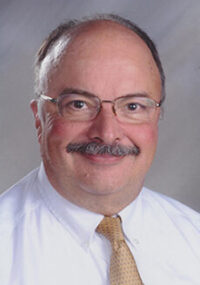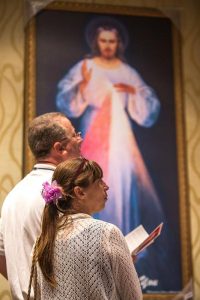When doubt comes, faith is only option

By Tim Irwin
Second Sunday of Easter (Sunday of Divine Mercy)/April 28
Acts 5:12-16; Psalm 118:2-4,13-15,22-24; Revelation 1:9-11a,12-13,17-19; John 20:19-31
This week the Gospel according to John features the endearing story of St. Thomas the Apostle. Endearing perhaps because we can easily see ourselves in the doubting Didymus. The story of his conversion seems especially timely on this, the annual celebration of Divine Mercy Sunday.
From this brief account in the Gospel, it seems that Thomas, like so many of us these days, looked at the world through pragmatic eyes. Faith would not satisfy him; he wanted evidence. We want evidence and the certainty that follows. Since we do not share in the rarefied air of the apostolic lock-in where the Risen Lord appeared, we will likely not see the evidence as Thomas did. We will not know what Thomas and the other apostles knew.
You may be wondering where this leaves us. The answer in a word is faith. Faith stands as the only option we have. Oh sure, we can claim that we know as Thomas knew, but that’s just changing what it means to know. We don’t know because we can’t know. If we could know, we would have no need of faith. Suppose that during his homily this week, your pastor said, “Join with me in faith and believe with me that Chicago is on the southwest end of Lake Michigan, amen.” You might think, “Who needs faith? I’ve been there and seen the lake. It’s actually hard to miss. I have firsthand knowledge; no faith required.”
EMBRACING THE STRUGGLE
In his moment of realization Thomas exclaims, “My Lord and my God!” Jesus said to him, “Have you come to believe because you have seen me? Blessed are those who have not seen and have believed.” That’s us. We are the ones who haven’t seen, cannot know, cannot have the certitude afforded by evidence, and yet we are invited to believe. In believing, we will experience the ongoing challenge of the absence of certitude that those who know don’t seem to face.
The most disinterested soul can know. In other words, it takes no empathy, no act of the human will to know. We expend little energy knowing Chicago’s location relative to Lake Michigan. Faith seems more of a trial as faith is both a gift from God and act of the human will. Perhaps more to the point, an ongoing act of the human will and like Thomas, we will doubt.
We cannot resolve our doubts once and for all as Thomas did, but we can strengthen our belief by practicing our faith. Prayer, sacrament, and service have proven over the centuries to be the way to fill the void we experience as doubt. History illustrates that this undertaking is a struggle.
EXPERIENCING DIVINE MERCY
To embrace our Catholic faith is to embrace the struggle and Divine Mercy Sunday offers a special opportunity to do this. The Congregation for Divine Worship and the Discipline of the Sacraments taught in a decree issued on May 23, 2000, that “Throughout the world the Second Sunday of Easter will receive the name Divine Mercy Sunday, a perennial invitation to the Christian world to face, with confidence in divine benevolence, the difficulties and trials that mankind will experience in the years to come.”
This Sunday the Lord’s commission recounted in the Gospel, “Receive the Holy Spirit. Whose sins you forgive are forgiven them, and whose sins you retain are retained,” can be experienced in a special way. We can experience forgiveness by participating in the special prayers and practices of the Divine Mercy Sunday. The directions can be easily found online.
All we need is faith in the one St. Thomas called, “My Lord and my God.”
Tim Irwin teaches theology and philosophy at Notre Dame High School in Peoria. He is a member of Blessed Sacrament Parish in Morton.






